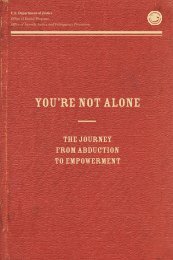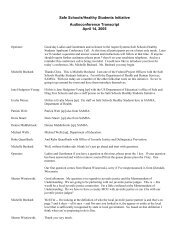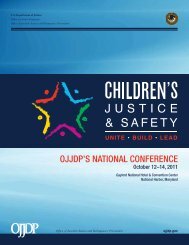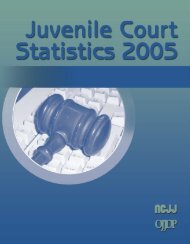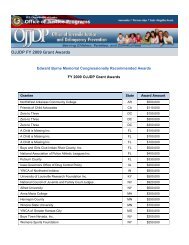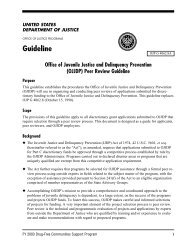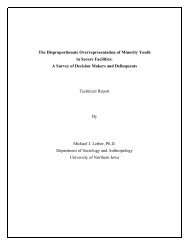OJJDP Family Listening Sessions: Executive Summary - Office of ...
OJJDP Family Listening Sessions: Executive Summary - Office of ...
OJJDP Family Listening Sessions: Executive Summary - Office of ...
Create successful ePaper yourself
Turn your PDF publications into a flip-book with our unique Google optimized e-Paper software.
Participant G’s Experiences With the System<br />
First involvement with the system<br />
The youth’s mother said her son was 13 years old the first time he went into the system—2 years<br />
ago. He recently got into trouble again and is still on probation. She told the circle that she is a<br />
single parent with four daughters in addition to her son, and admitted that she is a recovering<br />
alcoholic 30 days sober. She tries to talk to her son about her lessons learned because she has<br />
also been locked up in federal prison. The youth’s mother said she was released from prison only<br />
recently for a family emergency—when her mother died from a heart attack 4 months prior. She<br />
said she feels guilty for not being there for her son while she was in prison and that is one <strong>of</strong> the<br />
reasons she is grateful for being chosen to participate in the listening session with her son.<br />
What was the most helpful What was the least helpful<br />
The youth said that many people cared about him, but he rejected their support, which made him<br />
feel bad later. The counselor he saw while on probation was helpful and his grandmother was<br />
also supportive. After he was released from jail, he could not see his grandmother because she<br />
was in the hospital. “Now I want to follow her advice,” he said.<br />
Were you included in decisions in programs/support for your child Were your opinions<br />
heard and respected<br />
The youth’s mother said that it was not possible for her to be included as she was in treatment<br />
when her son was sent to detention for 6 months. Because the detention center was 3 hours away,<br />
his grandmother and sisters took turns visiting him once a month. For the first visit, her family<br />
travelled 3 hours for a restricted visit <strong>of</strong> 1 hour. For the second visit, they were allowed 2 hours<br />
with him. Her son wants to be placed in a treatment center for help and wants an opportunity to<br />
continue his education. “I want to make it happen for him if at all possible,” she said.<br />
<strong>Listening</strong> Session Outcome Themes<br />
Although the individual details were unique, consistent themes emerged during the session,<br />
including the following:<br />
• Overall, family members felt there was or should be reliance on family for support instead <strong>of</strong><br />
government or community-based programs. Some families believed it was their<br />
responsibility, and others felt responsible because <strong>of</strong> a lack <strong>of</strong> support from the system.<br />
• Truancy is a symptom <strong>of</strong> a greater systemic problem:<br />
o A result <strong>of</strong> being targeted or bullied in school—an issue the education system currently<br />
does not address.<br />
o Prevention programs would keep youth from being truant rather than intervening after<br />
they enter the system.<br />
39



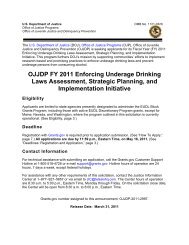
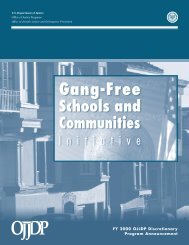
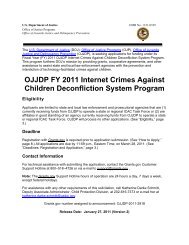
![Chapter 5 [PDF] - Office of Juvenile Justice and Delinquency ...](https://img.yumpu.com/46584340/1/190x245/chapter-5-pdf-office-of-juvenile-justice-and-delinquency-.jpg?quality=85)

